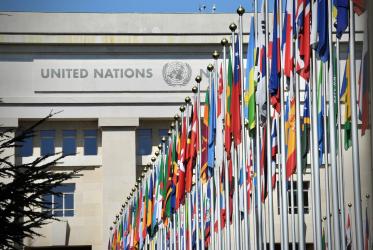Rev. Dr Samuel Kobia, World Council of Churches (WCC) general secretary, commented today on the situation in Sudan's Darfur region:
"We have urged the president of Sudan to work for an immediate end to hostilities and to take steps to resolve the conflict through a negotiated settlement so that much needed humanitarian relief is able to reach those in desperate need of such assistance.
"We also urged the president to take steps to put an end to human rights violations in the region and to ensure that those guilty of committing acts of violence and human rights abuses are brought to justice."
The WCC appeal to the president of the Republic of Sudan, Lieutenant-General Omar Hassan Ahmad al-Bashir, was made in a letter sent on 7 May, 2004.
The 14-month-old conflict in the Darfur region of western Sudan has been described as "one of the world's worst humanitarian crisis" by the United Nations World Food Programme executive director James Morris. As a result of the escalation of fighting between government forces and rebel groups, "over 700,000 Sudanese were internally displaced and another 110,000 were forced to cross the border into neighbouring Chad," Kobia explained.
Action by Churches Together (ACT) International, a global alliance of churches and related agencies of which the WCC is founding member, on 15 March, 2004 issued an emergency appeal for about US$ 800,000 to assist some 30,000 victims of the conflict in the Southern and Western Darfur regions. Members of ACT International are supporting the ACT appeal financially.
The history of the WCC's involvement in Sudan goes back to 1971 when the Council together with the All Africa Conference of Churches (AACC) was instrumental in brokering the Addis Ababa Peace Accord. Kobia himself was the ecumenical movement’s special envoy to Sudan, and took a special interest in pursuing peace and reconciliation there. "Sudan continues to remain close to my heart," Kobia said.
The WCC has since closely monitored developments in the conflict between North and South Sudan and efforts made to achieve a just and lasting peace. The WCC and its member churches, including those in Sudan, were greatly encouraged by the progress made by the government and the Sudan People’s Liberation Movement, under the auspices of the Intergovernmental Authority for Development (IGAD), to bring an end to Sudan’s 20 years of civil war.
Based on that history, and in keeping with the Machakos Protocol, the WCC general secretary also emphasized the urgent need for Sudan's government and the Sudan People’s Liberation Movement to undertake work on the drafting of a new constitution based on respect for human rights, justice and equality.
"We are willing to consider and help in promoting any proposal or suggestion that Sudan's government may have to contribute to an early end to the conflict so that peace can prevail," Kobia stressed.
Information on WCC work in Sudan is available on our website:
Minute on Sudan (Executive Committee meeting 17-20 February 2004)
www.wcc-coe.org/wcc/who/2004exco-minute1.html
1998 WCC Assembly in Zimbabwe: Policy Reference Committee II Report / Appendix I: Sudan
www.wcc-coe.org/wcc/assembly/or-8c-e.html
1998 WCC Assembly in Zimbabwe: WCC Urged to Intervene for the Suffering in Sudan






